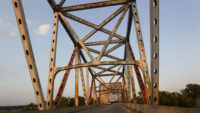Skanska USA Civil Northeast Inc. has agreed to pay $19.6 million to settle a federal investigation into disadvantaged-business-enterprise subcontracting practices among contractors on New York City.
According to the settlement announced March 31, the Whitestone, N.Y.-based unit of global Swedish contractor Skanska AB will not face any civil claims or criminal charges stemming from the probe, which is continuing.
But in a related indictment of owners of one of the contractor’s DBE subcontractors, Ridgefield, N.J.-based Environmental Energy Associates (EEA), prosecutors say that on one project, Skanska USA Civil Northeast “effectively self-performed the work…and helped create the appearance that EEA had done commercially useful work on the project.”
Indicted in federal district court in Manhattan on fraud and conspiracy charges were Balu Kamat and Carmine Desio, EEA’s president and vice president, respectively.
Each faces up to 40 years in prison, says Preet Bharara, U.S. Attorney in Manhattan. “The alleged conduct of these defendants deprived legitimate DBEs from receiving millions of dollars in lucrative government contracts,” he said in announcing the indictments.
The Skanska agreement and payment follow by three months similar actions taken in a case involving involving DBEs used on transportation and environmental projects by Secaucus, N.J.-based Schiavone Construction Co., now a unit of Spanish infrastructure giant, Dragados USA.
In a March 17 letter to Skanska’s attorneys, Bharara says the firm will not face prosecution for credits it claimed for use of minority, women and disadvantaged businesses since January 1997 on projects for the Metropolitan Transportation Authority, the Port Authority of New York and New Jersey and other agencies. Those agencies all were involved in the investigation.
Skanska USA Civil also is a major contractor for the city’s Dept. of Environmental Protection. That agency’s projects also were involved in the DBE investigation.
In a statement, Richard Cavallero, president of Skanska USA Civil Northeast, said that the firm “takes pride in its industry leadership in supporting diversity and we recognize, and regret, that we did not follow best practices with respect to our use of EEA as a D/M/WBE on certain projects. He added that “we’ve learned a tough lesson and we urge others in the industry to learn from it as well.”
According to the indictment, on various New York City transportation projects, Kamat and Desio allegedly entered into subcontracts for work they knew EEA could not perform. They also arranged to have third parties actually perform such work for which the executives received a “markup or fee,” and “purported to, but did not, in fact, do work for which primary contractors claimed DBE credit.”
Among the projects named in the indictment are the Dey Street Concourse project, which is part of the MTA’s $1.4-billion Fulton Street Transit Center job; the Port Authority’s World Trade Center transportation hub and a terminal project at John F. Kennedy International Airport.
According to the charges, EEA was awarded a $5.2-million subcontract on the Dey Street project, “with the northeast division of an international construction firm” for concrete and demolition work. Kamat and Desio “allegedly knew” the firm lacked the labor, equipment and finances to do the work, prosecutors said.
But the indictment charges that Skanska USA Civil Northeast “effectively” did the work itself, which prosecutors contend helped create the appearance that EEA had a role on the project.
In its statement, Skanska USA Civil said it did not admit to any wrongdoing “and has fully cooperated, and continues to cooperate” with the federal probe. It also agreed to complete within a year, a “comprehensive review” of all existing and new subcontracts with disadvantaged, minority and women-owned firms on New York area projects, and to report progress on the effort every three months to the D.A.
Skanska Civil also agreed to perform such reviews on all U.S. projects and “maintain an effective compliance and ethics program.”
Bharara said that Skanska’s payment will be split between MTA and the U.S. Transportation Dept., “representing, collectively, certain monies that Skanska paid EEA in connection with…contracts for which EEA served as a subcontractor.”
An MTA spokesman says the agency “hired an independent compliance monitor to be on the lookout for this and other types of construction fraud, and today's announcement is continued proof that the monitor performed exactly as expected.” Its share of the Skanska payout will cover the monitor’s cost. Officials say the agency also will use the funds to “combat construction fraud and improve opportunities.”




Post a comment to this article
Report Abusive Comment